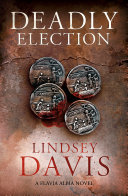Flavia Alba is the second series by Lindsey Davis, set in Ancient Rome, but later than her first. It’s later by a generation; Flavia Alba is the adopted daughter of the protagonist of the first series, Marcus Didius Falco. I’ve mentioned these series on many occasions, since I’ve been reading my way through Falco since I first found him in the 1980s. It’s in my Finishing the Series Reading Challenge. I just have the last book to go… No 20, Nemesis.
The new series, starting with The Ides of April, was published in 2013. I read it in 2014, and you can see the review here. I wasn’t going to continue this series until I’d finished Falco… Then my bookclub selected the third book for its August read, so I had to catch up first.
Enemies at Home (Flavia Alba #2)
We first met Flavia Albia, Falco’s feisty adopted daughter, in The Ides of April. Albia is a remarkable woman in what is very much a man’s world: young, widowed and fiercely independent, she lives alone on the Aventine Hill in Rome and makes a good living as a hired investigator. An outsider in more ways than one, Albia has unique insight into life in ancient Rome, and she puts it to good use going places no man could go, and asking questions no man could ask.
Even as the dust settles from her last case, Albia finds herself once again drawn into a web of lies an intrigue. A mysterious death at a local villa begs may be murder and, as the household slaves are implicated, Albia is once again forced to involve herself. Her fight is not just for truth and justice, however; this time, she’s also battling for the very lives of people who can’t fight for themselves.
Enemies at Home presents Ancient Rome as only Lindsey Davis can, offering wit, intrigue, action and the further adventures of a brilliant new heroine who promises to be as celebrated as Marcus Didius Falco and Helena Justina, her fictional predecessors. [Goodreads]
My review
It was a mere moment to step back in time and gather myself into post-Falco mode. Flavia Alba’s home is the world of dust and corruption that is Rome. I had forgotten she had a potential love interest. Eventually I remembered how they’d encountered each other in book one. Pleasingly, the young man (Tiberius) is worthy of her, intelligent enough, independent enough, and useful enough. He is an aedile, which is a bit like a sheriff, I suppose, in the Roman hierarchy.
Like most of these books, a body appears, and the question is, how did it come to be there. The critical part of this plot is that under Roman law, slaves belonging to the deceased are put to death for failing to rush to protect him from his assailant. This leads to plenty of concern on Flavia’s part both for the determination of the truth, and the ethics of putting slaves to death merely for being slaves.
![]() We are treated to a full on Lindsey Davis investigation, full of beautifully written intrigue, twists, red herrings, and blind alleys. She draws us into the alleys and byways of Rome, and I occasionally wonder how she manages to inhabit this bygone world so fully that we can almost smell it with her. I love this writing, and this book is one of her best.
We are treated to a full on Lindsey Davis investigation, full of beautifully written intrigue, twists, red herrings, and blind alleys. She draws us into the alleys and byways of Rome, and I occasionally wonder how she manages to inhabit this bygone world so fully that we can almost smell it with her. I love this writing, and this book is one of her best.
Deadly Election (Flavia Alba #3)
In the blazing July heat of imperial Rome, Flavia Albia inspects a decomposing corpse. It has been discovered in lots to be auctioned by her family business, so she’s determined to identify the dead man and learn how he met his gruesome end.
The investigation will give her a chance to work with the magistrate, Manlius Faustus, the friend she sadly knows to be the last chaste man in Rome. But he’s got other concerns than her anonymous corpse. It’s election time and with democracy for sale at Domitian’s court, tension has come to a head. Faustus is acting as an agent for a ‘good husband and father’, whose traditional family values are being called into question. Even more disreputable are his rivals, whom Faustus wants Albia to discredit.
As Albia’s and Faustus’ professional and personal partnership deepens they have to accept that, for others, obsession can turn sour, and become a deadly strain that leads, tragically, to murder. [goodreads]
My Review
Whilst you could jump into the Flavia Alba series with book 2, I would not recommend you do so with book 3. Unfortunately my bookclub did just that. We start once again with a body, this time in some goods to be sold by Flavia Alba’s family. I must have missed something somewhere, as Uncle Falco owns the auction house. He must have inherited it from his father.
Since Flavia was on duty in the family trade, she gets to discover the body. It has been putrifying in the August heat for some days. Meanwhile, Tiberius (aka Faustus) has asked her to help as he lends his support to a potential aedile, up for election in the winter. The candidates need to be whiter than white to resist the mud-slinging from their rivals.
These nuances of Roman life can be confusing, and although the author explains them well, I still find them tortuous. Each of Flavia’s quests is in itself understandable, until they entwine (as they inevitably would do). Like Falco’s book involving the Roman legal system, The Accusers, Flavia’s involving the election system gets somewhat dense. Worse, Davis chooses to contrive a whole family of sisters (five?) named Julia. Julia this, Julia that… I found it impossible to keep them straight and eventually let them wash over me. The trick is to think of them only by their second names, so the plot eventually made enough sense to be enjoyable. But did she really have to do that to her readers? It was pretty much a death knell to my bookclub. I’ve been trying to get them started on The Silver Pigs for ages, but they didn’t like this name confusion.
![]() So, a good enough story, with nice developments between Flavia Alba, Tiberius (Manlius Faustus) and the rest of the family. (I kept being distracted by the appropriateness of Flavia’s beau’s real name being Manlius. I suppose he is manly enough for her.) This story showed another side of the Roman system. But it’s one for devotees only, I think.
So, a good enough story, with nice developments between Flavia Alba, Tiberius (Manlius Faustus) and the rest of the family. (I kept being distracted by the appropriateness of Flavia’s beau’s real name being Manlius. I suppose he is manly enough for her.) This story showed another side of the Roman system. But it’s one for devotees only, I think.



